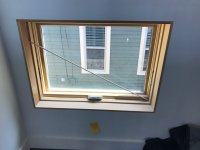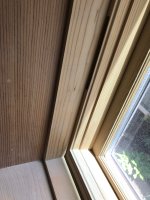Alex said:
I would do this job with my DTS400. One stop sander for the entire window, best result in the shortest time possible. I have owned every sander available in Europe but 2, and done a lot of paint jobs with them. The DTS400 remains the nicest and the most versatile in my eyes.
The LS130 is simply crap. As said above, it is very slow, and I think it is only usefull if you have a lot of profiles to do with the same shape. I much prefer to do these profiles by hand instead of the LS130. Unless you have to do 100's of meters the LS130 is useless.
I cannot find myself in aloysius' comments about the RO90. It's a fine sander, but you have to use it where it works best. That's not larger surfaces. I find it a typical 'spot repair' sander and used it mostly when paint was so bad in some spots that I had to sand it down to bare wood. That goes very fast in RO mode, but that's basically it with this sander. I don't understand why aloysius thinks the ergonomics is so bad while the Deltex is good. Both sanders' shapes come down to a pad on side, and a long body on the other side, so weight is never centered for either of them and you have to correct that yourself for both sanders with your grip.
My gripe with the RO90 is that it is too expensive in use, its abrasives cost 2,5 times that of any other Festool sander. So I had to let the sander go for this reason alone.
Alex, perhaps you will allow me to explain. My specific grievance/s regarding the RO90's "abysmal" ergonomics are thus: size, weight, balance, form & operation. Its true that the form factors are similar, but each & every dimension is simply larger in the Rotex. Except for one crucial dimension, that is.... the "stepover" of the working head in relation to the body that allows access to the otherwise inaccessible rebates etc. The smaller sizes of the Metabo, Bosch & Festo Deltex sanders, with greater actual stepover reach makes a world of difference where it's needed. In reno's this is fairly frequent; in stairs, windows, wainscoting, architraves and the like. The rather inconveniently placed & shaped airway effectively reduces this stepover dimension in the Rotex, severely compromising its utility.
In rough sanding/stripping operations, the narrow working diameter of the Rotex's head actually works against it. It tends to skip & hop and is anything but smooth or accurate. It requires even more of a "death grip" on it to maintain progress than even the much bigger, heavier and more powerful Rotex 150, where the width of the head actually enhances the tool's balance when "roughing it" in ROT mode. The result is that what SHOULD be a one-handed tool (like its competitors) instead becomes an extremely tiring two-handed fight with what is effectively a bit of a rogue tool instead. As you've used all the other tools that I've mentioned Alex, I think you know what I'm talking about!
It's all relative, 'though. Alex, as you've said that you've used every sander made in Europe, then I'm sure that you're aware of how smooth and easy (albeit slower) the 80mm Metabo SXE400 is to operate in comparison. The same is true also of the Festo Deltex & Bosch GDA Deltas. And how much more superior their fine finishing capabilities are in comparison to that which can be achieved by the small Rotex. I suspect that it's down to their respective ergonomics: that indefinable feel of size, weight, balance and centres of gravity when actually operated.
heck, the RO90 can't even fit between (open) stair treads in a rise of stairs built according to the regulation safety standards. A somewhat crucial oversight from the tool's designers if ever there was one! What were they thinking? If a purportedly "small" sander can't even approach the same or even similar capablities of it's rivals, then I personally consider it to be a bit of a dog. If the tool can't adequately fulfil its design brief, that of a small, versatile roughing/finishing/polishing tool for smaller and more inaccessible "nooks & crannies", then it's a design failure. If competitor's tools costing less than a quarter of the price can perform at least some of its capabilities in a superior manner then it's actually a bit of a lemon in my opinion.
As previously stated, it's just my opinion. I'm well aware that to many its adequate to their needs & requirements. I wonder how many have actually used a Deltex, Metabo SXE 400 or Bosch Delta in a back-to-back comparison? Alex, you imply that you actually have, but is that really the case? It is just so very, very much more than the respective tool's mere form factors that highlights the RO90's glaring inadequacies to me. That the same Manufacturer's alternative tools are in fact decidedly superior in operation, use & results achieved only highlight the RO90's defective nature: The RO125 & 150 & DX93E are just so much better at their allotted tasks than the 90 is. It's game over as far as I'm concerned. The RO90 is a poor tool.
But to a starving man, even rotting meat would seem a feast. It's all relative, if you've never experienced anything better.


